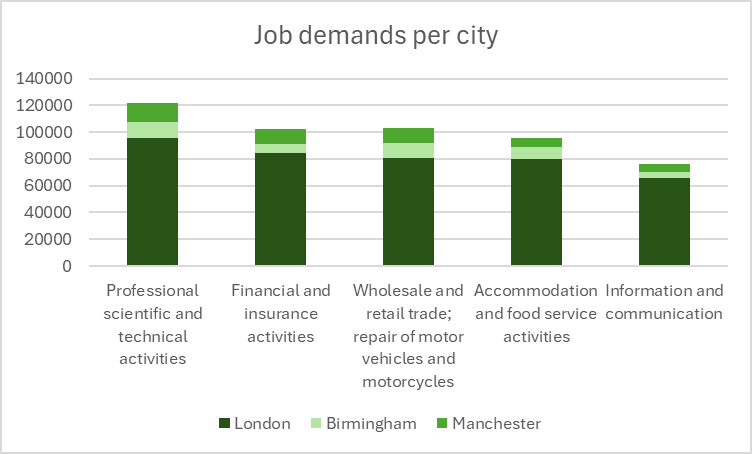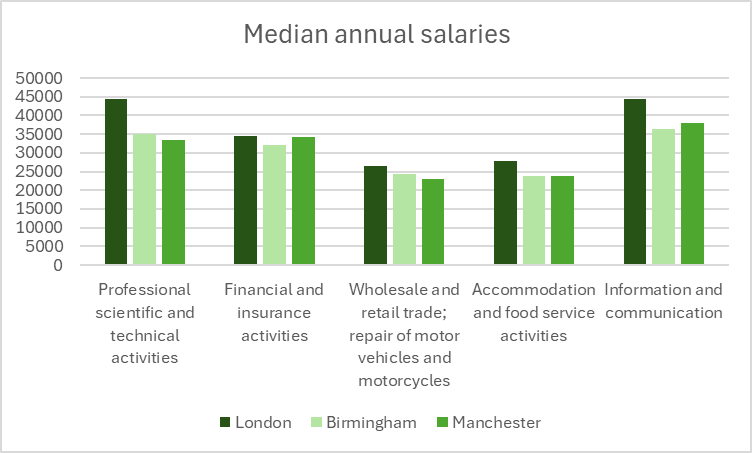Beyond the square mile: is hybrid work reshaping London’s job landscape?
3 Feb 2025
 Helena Saenz de Juano Ribes, Research Economist (Fellow)
Helena Saenz de Juano Ribes, Research Economist (Fellow)
This blog was originally published in January 2025 on the website of Adzuna, one of the largest online job search engines in the UK.
London has historically been the beating heart of the UK, serving as its capital and largest city for centuries. With a population exceeding 10 million, London dwarfs the next two largest cities, Birmingham and Manchester, with each of them having about 2.5 million residents. However, when it comes to job opportunities, the disparity between London and these cities is even more stark.
Despite numerous efforts to decentralise the UK economy, London remains the epicentre of job creation and economic activity. A 2021 report on the health of British microbusinesses finds that not only is London is at the centre of UK’s business activity, but also that the areas within close proximity to London also show some of the greatest microbusiness density, suggesting the benefits spill over from their proximity to London.
The Adzuna intelligence portal data illustrates the total job demand in London, Birmingham and Manchester during the last Financial Year of 2023-2024. Notably, it highlights the job demand imbalance across the cities, with London exceeding Birmingham and Manchester by nearly tenfold across the top five key industries such as professional scientific and technical activities, financial and insurance activities, wholesale and retail trade, accommodation and food services, and finally, information and communication. The city’s demand for roles in professional, scientific, and technical fields is particularly striking. Financial and insurance activities, another hallmark of London’s economy, similarly far outstrip demand in Birmingham and Manchester.

Moreover, using the Adzuna intelligence portal we calculate the gross salaries in the three biggest cities of the UK: London, Birmingham and Manchester. Not surprisingly, the offered median salaries being higher in the capital for these most demanded industries.
These facts have significant implications for the UK’s economy and society. London’s dominance in high-paying and high-skilled industries means it attracts talented individuals from across the UK, often at the expense of other regions. Despite these industries being central to the UK’s global competitiveness, they end up largely being concentrated in the capital, leaving other cities with fewer opportunities for growth.

The overwhelming concentration of jobs in London brings both benefits and challenges. While London drives much of the UK’s economic output, its magnetism exacerbates regional disparities. Skilled workers flock to the city, creating a brain drain in other regions, which struggle to attract investment or retain talent.
This concentration also has profound implications for London itself. The city’s infrastructure is under immense strain, with overcrowded public transport systems, sky-high housing costs, and rising inequality. Lower-income workers, essential to the city’s functioning, often find themselves priced out of decent housing and commuting long distances just to make ends meet. Meanwhile, London’s dominance leaves the UK economy overly reliant on a single city, making it vulnerable to economic shocks.
With the rise of remote working and shifting business practices, there is an unprecedented opportunity to rebalance the UK economy. Encouraging businesses to establish offices in cities like Birmingham and Manchester could provide a much-needed boost to these regions. Investments in transport connectivity, such as high-speed rail links, would make it easier for businesses and workers to thrive outside London. Furthermore, decentralising government functions and incentivising private companies to move their operations could create a more equitable distribution of opportunities.
Any views expressed are those of the author and not necessarily those of the Institute as a whole.

